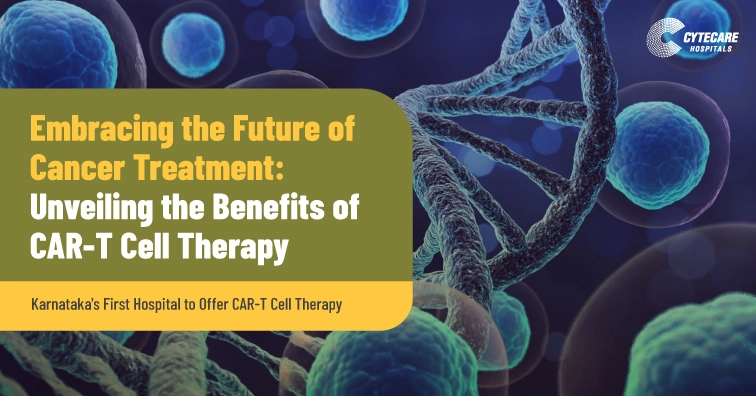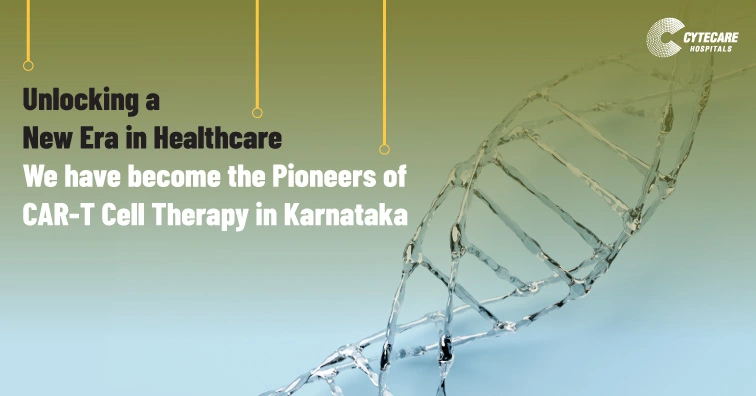
Related posts

First Hospital to Offer CAR-T Cell Therapy in Karnataka.
In the world of cancer treatment, revolutionary advances are continually developing. Today, we explore one such development: the CAR-T cell therapy. This therapy is emerging as a beacon of hope for cancer patients around the globe, offering a novel approach towards combating this relentless disease.
CAR-T Cell Therapy: The New Frontier in Cancer Treatment
Cancer has perpetually been one of the most complex health problems to tackle. Traditional treatments like chemotherapy, radiation therapy, or surgery have their limitations and often impose severe side effects. That’s where the Chimeric Antigen Receptor T-cell (CAR-T) cell therapy steps in.
What is CAR-T Cell Therapy
CAR-T cell therapy is a type of immunotherapy that harnesses your body’s immune system to fight cancer cells more effectively. It involves modifying patient’s T-cells (a type of immune cell) to express a specific receptor, known as a chimeric antigen receptor (CAR), enabling these cells to target and kill cancer cells.
Unlocking the Mechanism of CAR-T Cells
Under normal circumstances, our body’s immune system can recognise and eliminate foreign invaders like bacteria and viruses. However, cancer cells skillfully evade the immune system, leading to uncontrolled proliferation.
In CAR-T cell therapy, T-cells are genetically engineered in the laboratory to express the CAR, which recognises a specific antigen (protein) on the cancer cell’s surface. These modified T-cells are then expanded in number and reintroduced into the patient’s body. On infusion, these engineered cells circulate throughout the body, hunting for the cancer cells and initiating their destruction.
Benefits of CAR-T Cell Therapy?
Despite being a relatively new form of treatment, CAR-T cell therapy has shown promising benefits, especially for patients with blood cancers who no longer respond to other treatment forms.
- Infusing New Life in Refractory or Relapsing Patients
Many trials have shown that CAR-T cell therapy can achieve remission in patients who had previously exhausted all other treatment options. This is particularly pronounced in relapsed or refractory acute lymphoblastic leukemia (ALL) and non-Hodgkin lymphoma (NHL), where CAR-T cell therapy has achieved spectacular remission rates.
- Long-Term Remission
For many patients, CAR-T therapy has been shown to offer durable remissions – that is, the cancer remains at bay for an extended period after the treatment. This gives patients a reprieve from the continuous cycle of cancer treatments and enhances their quality of life significantly.
- Personalised Treatment
Unlike standard cancer therapies, CAR-T cell treatment is highly individualized. The T-cells used for therapy are collected from the patient, modified, and then reintroduced. This personalization increases the chances of a positive response and reduces the likelihood of certain side-effects, making the treatment safer for the individual patient.
A Brighter Horizon for Cancer Patients
CAR-T cell therapy is truly a landmark in the ongoing saga against cancer, offering new hope to patients who had previously exhausted their treatment opportunities.
Indeed, every step we take in understanding cancer better and developing innovative treatments like CAR-T cell therapy translates into giving cancer patients a chance for a longer and healthier life. This personalised, patient-centred treatment approach is one key element in the future of cancer care, a future that looks increasingly brighter than ever before.
Cytecare Hospital Bangalore has collaborated with ImmunoACT to provide CAR-T Cell treatment for refractory or relapsing B-cell lymphoma and B-acute lymphoblastic leukaemia in patients aged 15 and above. Get in touch with us to understand more about CAR-T Cell therapy and its impact.